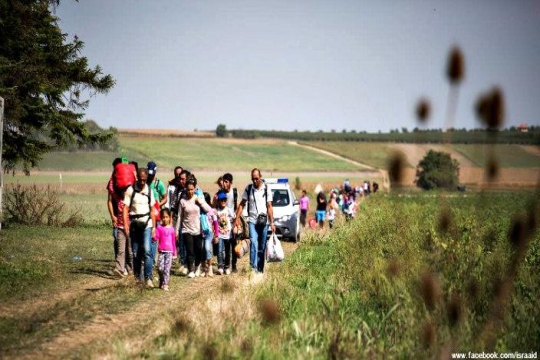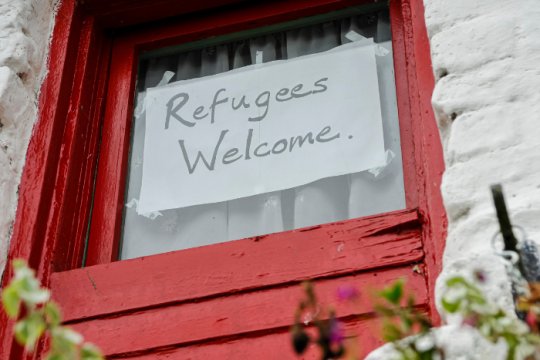
The world is currently facing the worst refugee crisis in global history. More than 82 million people worldwide have left home to escape conflict and persecution, surpassing the previous record of displaced persons after World War II. Refugees - those forced to flee their country for fear of persecution, war, or violence - account for about 26 million of those displaced. In the past year, we have seen millions of new refugees displaced due to the conflicts in Ukraine and Afghanistan.
Every year on June 20, we honor the resilience and courage of refugees and celebrate their contributions to our communities and to our entire nation. The best way to honor and celebrate refugees is by taking action to make the U.S. a more welcoming place for those seeking safety.
The crisis in Ukraine has already created almost five million refugees and counting. On April 25, U.S. Citizenship and Immigration Services (USCIS) announced Uniting for Ukraine - a program to accept 100,000 Ukrainian refugees to the U.S. and give them a status called Humanitarian Parole. This status was also given to tens of thousands of Afghan refugees who were evacuated after the Taliban took over Afghanistan. Humanitarian Parole is a temporary status which allows certain individuals to enter and stay in the U.S. without a visa. Processing for humanitarian parole can take days or mere hours, compared to the months or years it can take for visas to be processed. However, this temporary status does not grant them any refugee benefits or provide a pathway to permanent residency. Parolees will have to apply for asylum or a visa, both of which are currently severely backlogged, leaving parolees indefinitely uncertain of their status in the U.S.
In addition to addressing the inadequate temporary solutions, the federal government must also address the decimation of the U.S. asylum system. An asylum seeker is an individual who meets the international definition of a refugee and applies for protection inside the U.S. or at the border. Under U.S. and international law, anyone who steps on U.S. soil or who presents themselves at a U.S. port of entry is entitled to apply for asylum.
Prior to the COVID-19 pandemic, individuals claiming asylum are allowed to make their claim and wait within the U.S. as their case is decided. But during the pandemic, the Trump administration invoked Title 42, a policy that uses the guise of public health to prevent people from legally seeking refuge in the U.S. Since the start of the pandemic, the United States has summarily expelled over 1.7 million asylum seekers under Title 42, and, despite promising to end the policy, it has continued for over a year under President Biden. On April 1, the CDC announced its plan to end Title 42 by May 23, but a federal judge in Louisiana blocked the administration from ending the unjust, unlawful policy. In addition, since the CDC's announcement, some members of Congress have proposed keeping Title 42 in place indefinitely.
Everyday Title 42 remains in place it puts more people in danger. Since president Biden took office, there have been over 10,000 reported violent attacks against people blocked from seeking asylum under Title 42. The policy has a disparate impact on Black migrants seeking safety. Since taking office in January 2021, the Biden administration has expelled over 21,000 Haitians back to Haiti under Title 42. In November 2021, the U.S. opened its borders to non-essential travel, but Black migrants and asylum-seekers are still being turned away at the border. The Biden administration must recognize and address the racism that underpins the U.S. immigration, asylum, and refugee resettlement systems.
Pirkei Avot reminds us, "It is not your responsibility to finish the work, but neither are you free to desist from it" (2:16). As a community descended from immigrants and refugees, with a long history of persecution and sojourning in foreign lands, we have a unique responsibility to ensure that the rights of refugees and asylum seekers are protected. Furthermore, the Torah places a great importance on how we treat the "ger" - or foreigner among us - by commanding just treatment in over 36 ways. Perhaps most famously, Leviticus teaches, "When a stranger resides with you in your land, you shall not wrong them. The stranger who resides with you shall be to you as one of your citizens; you shall love them as yourself, for you were strangers in the land of Egypt" (19:33-34). We draw inspiration from these sources and others as we call on our elected officials to welcome and protect those seeking safety on our shores.
Here are some ways you can take action for refugees and asylum seekers on World Refugee Day and beyond:
- Tell Congress to end Title 42 and restore asylum now.
- Urge Congress to support Afghan refugees by passing an Afghan Adjustment Act (AAA). The AAA would allow certain Afghan evacuees to apply for permanent status after one year of being in the U.S.
- Call on Congress to support refugee resettlement by passing the Guaranteed Refugee Admission Ceiling Enhancement (GRACE) Act (H.R.2237 / S.1135). Throughout his presidency, President Trump set record low number refugee ceilings. While President Biden has remedied this, the U.S. must remain committed to robust refugee resettlement regardless of who is in the White House. Under the GRACE Act, the refugee ceiling could never be lower than 125,000 refugees.
Related Posts

Welcoming the Stranger: How Reform Congregations are Taking Action for Refugees

Global Refugee Crisis: Where We Are and How You Can Help


